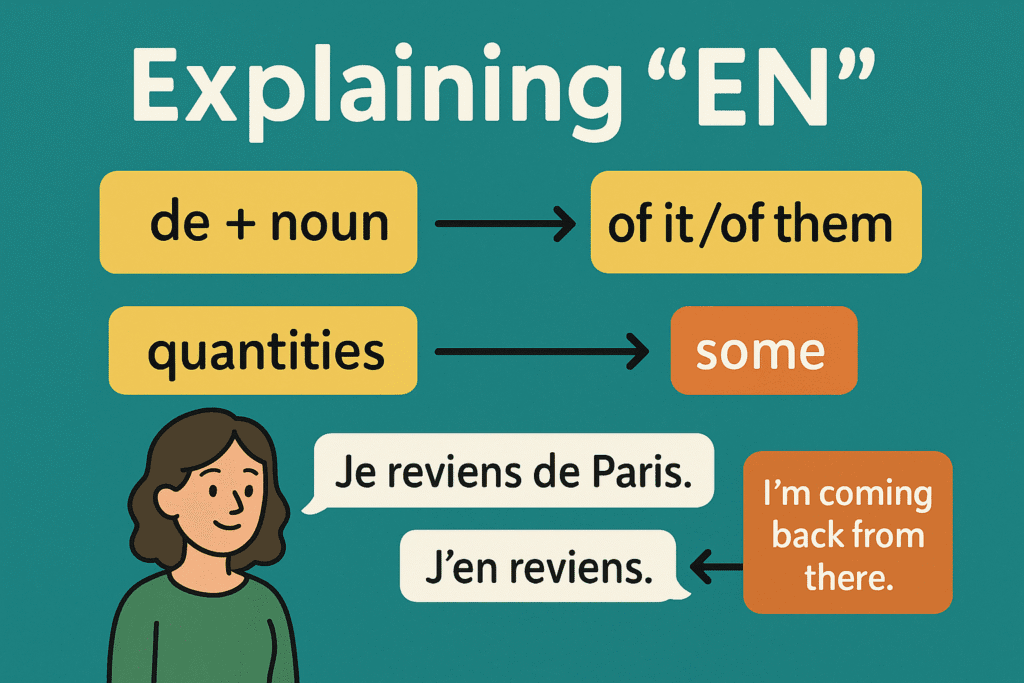Goal: Understand how to use “en” in real French sentences – with no stress!
What is “EN” in French?
“En” is a pronoun that replaces:
- “de” + noun
- quantities (some, any, a lot of, etc.)
- places introduced with “de”
It’s like saying:
🔸 some
🔸 of it / of them
🔸 from there
It may feel strange at first, but you’ll hear and use “en” all the time.
🔹 1. Use “EN” to replace “de” + thing or idea
You can use “en” to avoid repeating a phrase with “de”.
✅ Examples:
- Tu parles de ton travail ?
→ Oui, j’en parle.
(Are you talking about your work? → Yes, I’m talking about it.) - Il a besoin de sommeil.
→ Il en a besoin.
(He needs sleep → He needs it.) - Je rêve de vacances.
→ J’en rêve.
(I dream of a vacation → I dream of it.)
🔹 2. Use “EN” with quantities (split in 2 parts)
🔸 A) With partitive articles (du, de la, de l’)
Use “en” when the noun is preceded by du / de la / de l’, which usually means “some” in English.
This refers to an unspecified amount.
✅ Examples:
- Il prend du pain.
→ Il en prend.
(He takes some bread → He takes some.) - Elle mange de la salade.
→ Elle en mange.
(She eats some salad → She eats some.)
🔸 B) With numbers or specific quantities
When the noun is replaced but the number stays, you still use “en” — but keep the number or expression of quantity.
This refers to countable or measurable quantities.
✅ Examples:
- Tu as trois chats ?
→ Oui, j’en ai trois.
(You have 3 cats → I have 3 (of them).) - Elle a beaucoup d’amis.
→ Elle en a beaucoup.
(She has many friends → She has many (of them).) - Vous avez une bouteille ?
→ Oui, j’en ai une.
(Do you have a bottle? → I have one.)
💡 The noun disappears, but the quantity stays after “en”.
🔹 3. Use “EN” to mean from there / from it
Sometimes, “en” can also replace a place introduced with “de”.
✅ Examples:
- Je reviens de Paris → J’en reviens.
(I’m coming back from Paris → I’m coming back from there.) - Ils sortent du restaurant → Ils en sortent.
(They’re coming out of the restaurant → They’re coming out of it.)
Word order: Where does “EN” go?
Like most pronouns in French, “en” goes before the verb.
| French sentence | Translation |
|---|---|
| J’en ai. | I have some. |
| Tu en veux ? | Do you want some? |
| Elle en parle. | She’s talking about it. |
| Nous en revenons. | We’re coming back from there. |
With an infinitive, it goes before the verb:
- Je vais en acheter. → I’m going to buy some.
- Il veut en parler. → He wants to talk about it.
⚠️ Don’t use “EN” for people
If you’re replacing “de” + person, use a stressed pronoun instead:
- Tu parles de Marie → ✅ Tu parles d’elle
❌ Not Tu en parles
🧪 Quick practice – Translate these:
- I want some coffee → __
- Are you talking about it? → __
- He has two dogs → __
- I’m coming back from there → __
- She needs it → __
✅ Show answers
1.J’en veux.
2.Tu en parles ?
3.Il en a deux.
4.J’en reviens.
5.Elle en a besoin.
Recap
| Use EN to replace… | Example |
|---|---|
| “de” + noun (thing, not person) | Tu parles de ton travail → J’en parle |
| quantity + noun | Tu as trois chats → J’en ai trois |
| partitive articles (du, de la, etc.) | Il prend du pain → Il en prend |
| place introduced with “de” | Je reviens de Paris → J’en reviens |
❌ Not for people

Want to get more comfortable using “en”?
Practice makes it natural — and once you master “en”, your French will sound so much more fluent.
